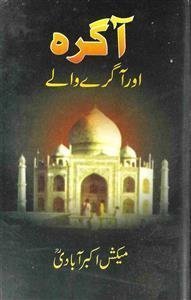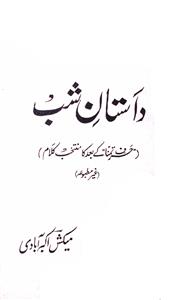About The Book
میکش اکبرآبادی کی شخصیت محتاج تعارف نہیں، وہ ایک اچھے ادیب، شاعر، مفکر اور تصوف و فلسفہ کے دلدادہ شخصیت تھے۔ ان کی یہ کتاب آگرہ اور آگرہ کے اشخاص کا تہذیبی و تاریخی مرقع ہے۔ جس میں موصوف نے آگرہ کی ادبی و تہذیبی ہلچل کو بیان کیا ہے، اس کے میلوں ٹھیلوں اور اس کی شعری نشستگاہوں، روزہ تاج کی تاریخی اہمیت اور آگرہ کے لوگوں کے بارے میں کافی حد تک بحث کی ہے۔ آگرہ سے متعلق یہ ایک بہترین کتاب ہے۔ نیز 'غبار کارواں' کے عنوان سے اپنی خود نشست بھی پیش کی ہے۔
About The Author
Maikash Akbarabadi was born in March 1902 in Mewa Katra, Agra. His predecessor Syed Ibrahim Qutb Madani came to India from Madina during the reign of Mughal Emperor Jaha'ngir and made Akbarabad his home. Born as Syed Muhammad Ali Shah, he chose Maikash as his pen-name. His grandfather Syed Muzaffar Ali Shah swore allegiance to Hazrat Nizamuddin Ahmed, son of Shah Niaz Ahmed Barelvi and became his caliph. His father Syed Asghar Ali Shah died at a young age. Maikash’s education was looked after by his mother who was a a wise and prudent woman full of knowledge and drive. For the education of her son, she got the scholarly services of the most qualified scholars from the city and abroad, such as Maulvi Abdul Majeed, for a large sum of money. He was admitted to Madrasa Alia Agra from where he studied external sciences. He also became the Sajjada Nashin of Khanqah Niazia, customary to his family tradition. Maikash Akbarabadi married Siddiqui Begum, daughter of Hashmat Ali Akbarabadi at the age of 17 years. After Begum’s death, Maikash married Asif Jaha'n, the daughter of Nawab Mustafa. Finding difficult to handle the familial responsibilities and customs of Maikash, Asif Jaha'n renounced the marriage and moved to Pakistan, and later passed away there. Maikash Akbarabadi belonged to the Jafari lineage and the Sunni Hanafi Sufi faith. He is considered as one of the most learned writers and poets of India. Maikash always had a penchant for music and was fond of playing the Sitar since childhood. Apart from this, he also had a good grasp of logic. In his childhood, he was also fond of debates and discussions. In his time, Urdu ghazal was moving towards a new place. his contemporaries Hasrat Mohani, Shah Mohsin Danapuri, Asghar Gondvi, Fani Badauni, Saba Akbarabadi, Jagar Muradabadi were adapting ghazals in their own unique accents and melodies. Maikash, with his bent for mysticism, effectively expressed Sufistic themes such as unity of existence, annihilation and remanence, existence and non-existence, etc. Some of his prominent works are: Naqd-e-Iqbal, Naghma Aur Islam, Masaail-e-Tasawwuf, Tauheed aur Shirk, Maikada, Harf-e-Tamanna, Farzandan-e-Hazrat Ghous-ul-Azam, Dastan-e-Shab etc.


